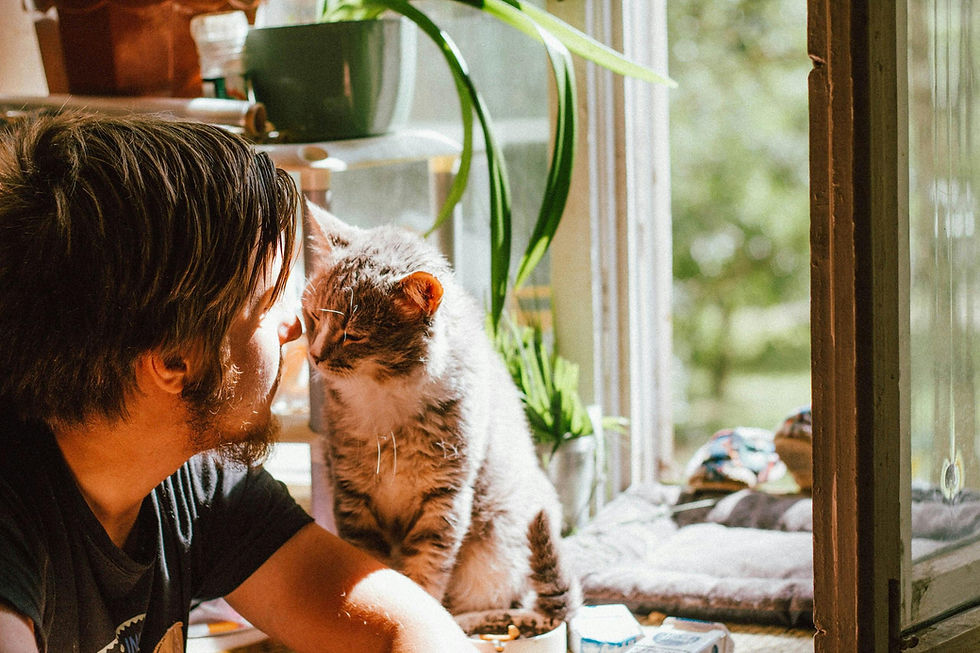Lizard Care: Ensuring Health and Wellness for Your Reptile Companions
- May 2, 2024
- 3 min read
Updated: Mar 20, 2025

With their fascinating behaviors and unique appearances, Lizards make captivating pets for reptile enthusiasts. As a proud owner of a colorful chameleon, a majestic bearded dragon, a vibrant gecko, a sleek skink, an energetic anole, or a desert-dwelling uromastyx, you play a crucial role in their health and well-being. Here's a quick guide to lizard care, focusing on pet health and wellness, along with insights on how your My Pet's Vet veterinarian can support you in providing the best care for your scaley companion.
Proper Enclosure and Habitat: Creating a suitable habitat is crucial for your lizard's health and well-being. Research the specific environmental needs of your lizard species, including temperature, humidity, lighting, and substrate preferences. Provide a spacious enclosure with appropriate hiding spots, climbing structures, and basking areas to mimic their natural habitat.
Nutrition and Diet: Offer a varied diet that meets the nutritional needs of your lizard species. Consult with a reptile veterinarian or herpetologist to determine the optimal diet for your pet. Most lizards require a combination of live insects, such as crickets, mealworms, roaches, and fresh fruits and vegetables. Ensure proper calcium and vitamin supplementation to prevent nutritional deficiencies.
Temperature and Lighting: Maintain the appropriate temperature gradient within the enclosure to allow your lizard to regulate their body temperature effectively. Use heating elements such as heat lamps, ceramic heat emitters, or under-tank heaters to create warm basking spots and cooler areas. Provide full-spectrum UVB lighting to support vitamin D synthesis and calcium metabolism.
Humidity and Hydration: Monitor and maintain optimal humidity levels within the enclosure to prevent dehydration and respiratory issues. Provide a shallow water dish for drinking and ensure proper hydration by misting or providing a humidifier, especially for species requiring higher humidity levels.
Environmental Enrichment: Offering enrichment activities within the enclosure promotes mental stimulation and physical activity. A branch, rock, tunnel, and other environmental features provide climbing, burrowing, and exploring opportunities. Rotate and vary enrichment items regularly to prevent boredom and encourage natural behaviors.
Veterinary Care: Schedule regular wellness exams with one of our veterinarians to monitor your lizard's health and detect any underlying issues early. Our reptile veterinarians, with their expertise in exotic pet care, are trained to provide specialized care for your lizard. They can offer guidance on husbandry, nutrition, and preventive health care, including vaccination and parasite prevention recommendations to protect your lizard from common reptile diseases and parasites.
Disease Prevention and Zoonotic Risks: Be aware of common reptile diseases and zoonotic risks that can affect both lizards and humans. Practice good hygiene, such as washing hands thoroughly before and after handling reptiles or cleaning enclosures, to prevent the transmission of pathogens. Monitor your lizard for signs of illness, such as changes in appetite, behavior, or skin condition, and seek veterinary care promptly if any abnormalities are observed.
Emergency Preparedness: Prepare for emergencies with a reptile first aid kit and emergency supplies. Familiarize yourself with common reptile emergencies and know how to respond in case of illness, injury, or escape. Keep important contact information, including our contact information and the nearest exotic animal emergency clinic, readily accessible. Remember, in emergencies, the expertise of My Pet's Vet veterinarians can be invaluable.
How My Pet's Vet Veterinarians Can Help Care For Your Lizard:
At My Pet's Vet, our highly skilled and experienced veterinarians are committed to providing compassionate and specialized care for exotic pets, including lizards. From comprehensive wellness exams and tailored nutritional counseling to effective parasite prevention and treatment, we offer a wide range of services to ensure the health and well-being of your scaley companions. Our reptile experts are well-versed in the unique needs of different lizard species and can provide personalized recommendations, ensuring your pets thrive in their captive environment.
By following these expert tips and guidelines, you can ensure the health and wellness of your lizard companions and provide them with a fulfilling and enriched life. Remember to consult with a My Pet’s Vet veterinarian for personalized recommendations and guidance tailored to your lizard's specific requirements.










Comments